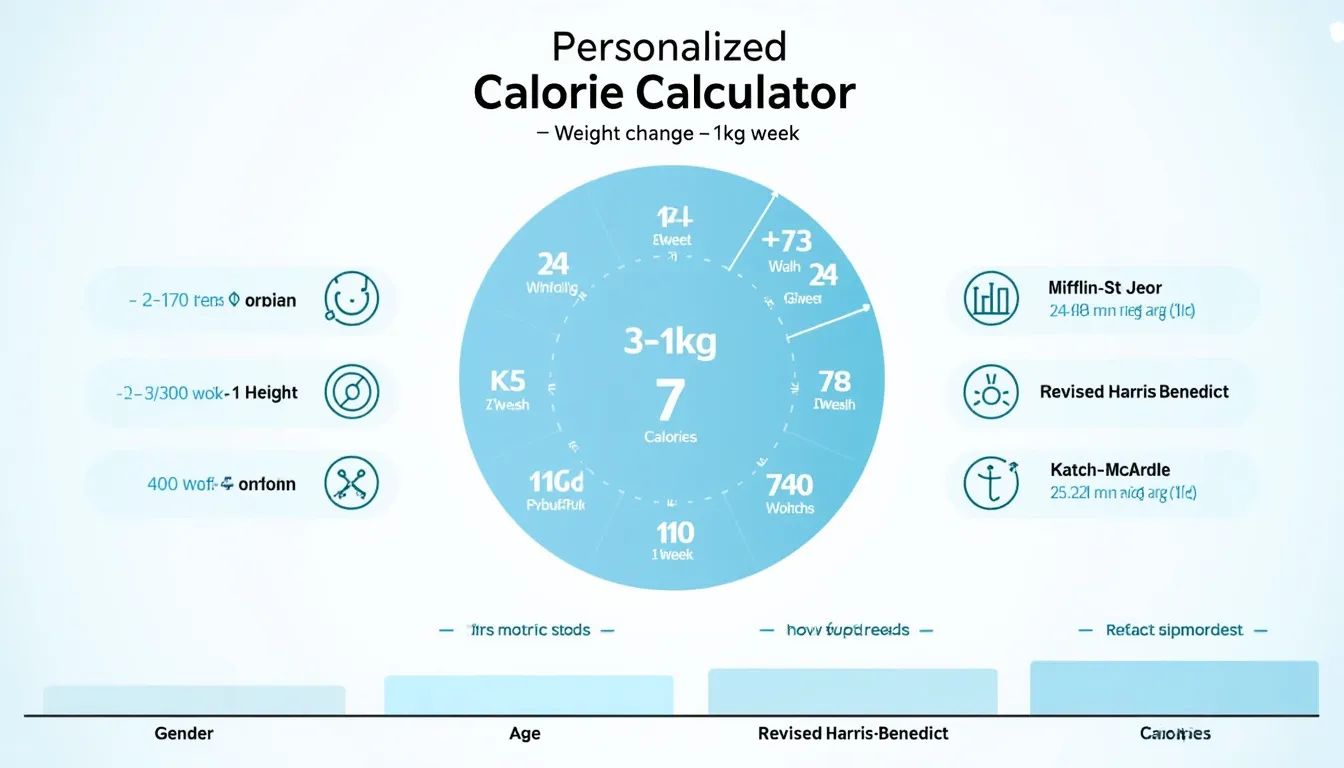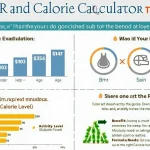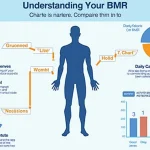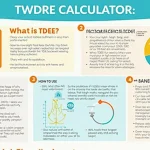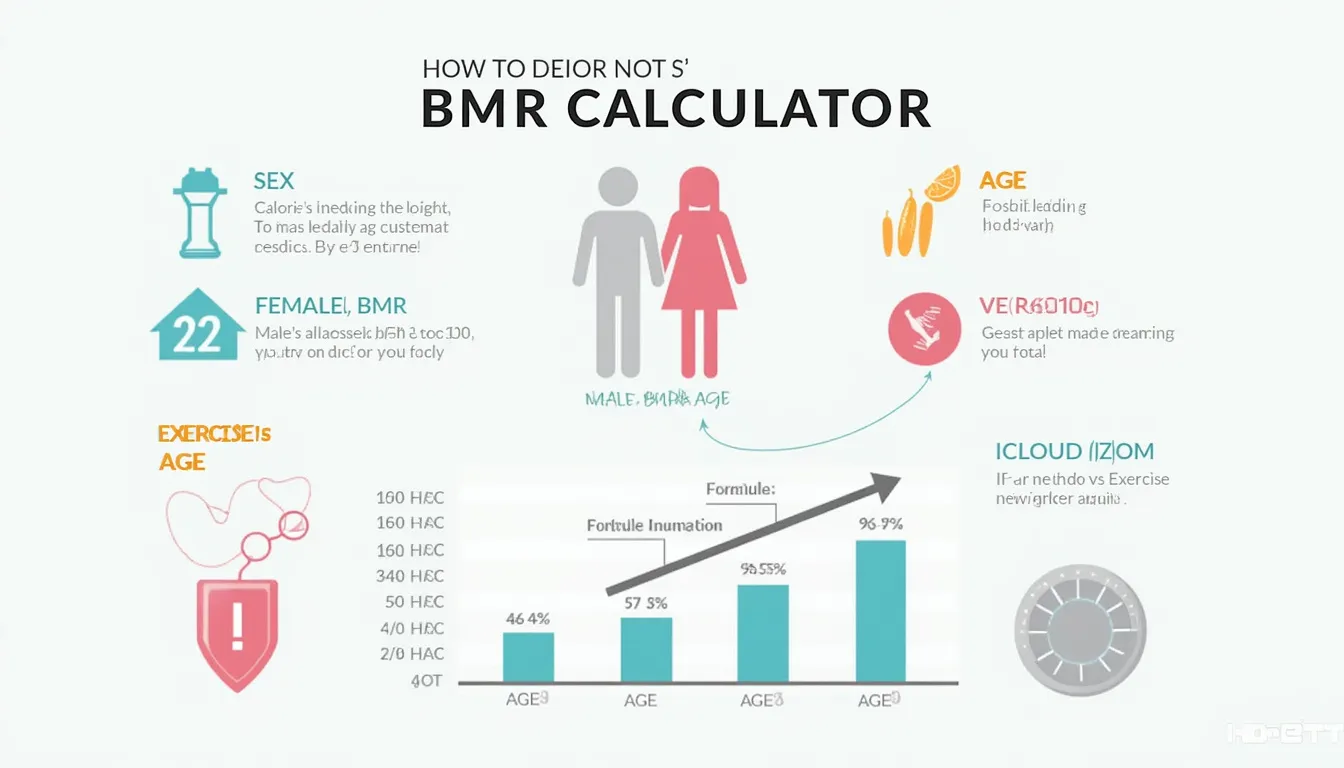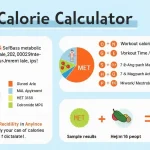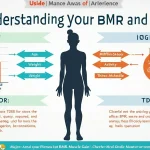Calorie Calculator
Is this tool helpful?
How to use the tool
- Gender – pick female or male. Sample: female or male aged 42.
- Activity level – reflect your week. Examples: Sedentary: office work, no exercise or Extra Active: bike courier.
- Formula – choose: Mifflin St Jeor, Revised Harris-Benedict, or Katch-McArdle (needs body-fat %).
- Weight (kg) – enter mass, e.g., 90 kg or 54.5 kg.
- Height (cm) – add stature, e.g., 175 cm or 158 cm.
- Age (15-80) – input 23 years or 67 years.
- Body-fat % – only for Katch-McArdle: 22 % or 14 %.
- Calculate – read calories for losing, maintaining, or gaining weight.
Core formulas
- Mifflin St Jeor
$$\text{BMR}_{m}=10W+6.25H-5A+5$$ $$\text{BMR}_{f}=10W+6.25H-5A-161$$ (Mifflin et al., 1990) - Revised Harris-Benedict
$$\text{BMR}_{m}=13.397W+4.799H-5.677A+88.362$$ $$\text{BMR}_{f}=9.247W+3.098H-4.330A+447.593$$ (Roza & Shizgal, 1984) - Katch-McArdle
$$\text{BMR}=370+21.6\,\times\,LBM$$ $$LBM=W\,(1-\frac{BF}{100})$$ (Katch & McArdle, 1996)
Convert BMR to total daily energy expenditure (TDEE) with the multiplier: Sedentary 1.2 … Extra Active 1.9 (FAO/WHO/UNU, 2001).
Example calculations
Example A – Revised Harris-Benedict, sedentary male
- W = 90 kg, H = 175 cm, A = 40 y
- BMR = 13.397×90 + 4.799×175 − 5.677×40 + 88.362 = 1906.8 cal
- TDEE = 1906.8 × 1.2 = 2288 cal
Example B – Mifflin St Jeor, active female
- W = 55 kg, H = 160 cm, A = 23 y
- BMR = 10×55 + 6.25×160 − 5×23 − 161 = 1274 cal
- TDEE = 1274 × 1.55 ≈ 1975 cal
Example C – Katch-McArdle, moderate male
- W = 78 kg, BF = 20 %, A = 35 y
- LBM = 78 × 0.8 = 62.4 kg
- BMR = 370 + 21.6 × 62.4 = 1717.8 cal
- TDEE = 1717.8 × 1.465 ≈ 2516 cal
Quick-Facts
- BMR accounts for 60-75 % of total energy use (Heymsfield et al., 2014).
- Deficit of 7700 cal equals ≈1 kg fat loss (Hall et al., 2012).
- Healthy loss pace: 0.25-1 kg/week (CDC, 2022).
- PAL multipliers span 1.2 to 1.9 (FAO/WHO/UNU, 2001).
- Body-fat under 25 % suits Katch-McArdle (NSCA Guide, 2017).
FAQ
What does the calculator provide?
Your maintenance calories and targets for ±0.25, 0.5, 1 kg per week using validated metabolic equations (Mifflin et al., 1990).
Which formula should you choose?
Mifflin suits most adults; Revised Harris-Benedict helps heavier bodies; Katch-McArdle excels when you know body-fat percentage (NSCA Guide, 2017).
How accurate are activity multipliers?
They stem from FAO/WHO/UNU standards and capture lifestyle variance within ±15 % error (FAO/WHO/UNU, 2001).
What calorie deficit promotes fat loss?
Create a 500 cal daily gap to shed about 0.45 kg weekly (NIH, 2020).
Why include body-fat percentage?
It lets Katch-McArdle tailor energy needs to lean mass, boosting precision for athletes (Katch & McArdle, 1996).
Does age affect calorie demand?
BMR drops roughly 1-2 % per decade after 20 years (Heymsfield et al., 2014).
How often should you recalculate?
Update every 4-6 weeks or after ±2 kg body change to stay accurate (ACSM, 2018).
Can you gain muscle while losing fat?
You can by combining mild calorie deficit with 1.6-2.2 g protein/kg and resistance training (Phillips, 2014).
Important Disclaimer
The calculations, results, and content provided by our tools are not guaranteed to be accurate, complete, or reliable. Users are responsible for verifying and interpreting the results. Our content and tools may contain errors, biases, or inconsistencies. Do not enter personal data, sensitive information, or personally identifiable information in our web forms or tools. Such data entry violates our terms of service and may result in unauthorized disclosure to third parties. We reserve the right to save inputs and outputs from our tools for the purposes of error debugging, bias identification, and performance improvement. External companies providing AI models used in our tools may also save and process data in accordance with their own policies. By using our tools, you consent to this data collection and processing. We reserve the right to limit the usage of our tools based on current usability factors.
